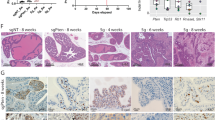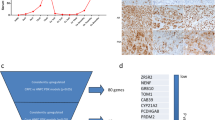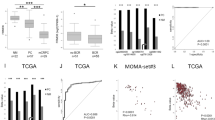Abstract
Effective clinical management of prostate cancer (PCA) has been challenged by significant intratumoural heterogeneity on the genomic and pathological levels and limited understanding of the genetic elements governing disease progression1. Here, we exploited the experimental merits of the mouse to test the hypothesis that pathways constraining progression might be activated in indolent Pten-null mouse prostate tumours and that inactivation of such progression barriers in mice would engender a metastasis-prone condition. Comparative transcriptomic and canonical pathway analyses, followed by biochemical confirmation, of normal prostate epithelium versus poorly progressive Pten-null prostate cancers revealed robust activation of the TGFβ/BMP–SMAD4 signalling axis. The functional relevance of SMAD4 was further supported by emergence of invasive, metastatic and lethal prostate cancers with 100% penetrance upon genetic deletion of Smad4 in the Pten-null mouse prostate. Pathological and molecular analysis as well as transcriptomic knowledge-based pathway profiling of emerging tumours identified cell proliferation and invasion as two cardinal tumour biological features in the metastatic Smad4/Pten-null PCA model. Follow-on pathological and functional assessment confirmed cyclin D1 and SPP1 as key mediators of these biological processes, which together with PTEN and SMAD4, form a four-gene signature that is prognostic of prostate-specific antigen (PSA) biochemical recurrence and lethal metastasis in human PCA. This model-informed progression analysis, together with genetic, functional and translational studies, establishes SMAD4 as a key regulator of PCA progression in mice and humans.
This is a preview of subscription content, access via your institution
Access options
Subscribe to this journal
Receive 51 print issues and online access
$199.00 per year
only $3.90 per issue
Buy this article
- Purchase on Springer Link
- Instant access to full article PDF
Prices may be subject to local taxes which are calculated during checkout




Similar content being viewed by others
References
Andreoiu, M. & Cheng, L. Multifocal prostate cancer: biologic, prognostic, and therapeutic implications. Hum. Pathol. 41, 781–793 (2010)
Jemal, A., Siegel, R., Xu, J. & Ward, E. Cancer statistics, 2010. CA Cancer J. Clin. (2010)
Walsh, P. C., DeWeese, T. L. & Eisenberger, M. A. Localized prostate cancer. N. Engl. J. Med. 357, 2696–2705 (2007)
Rubin, M. A. Targeted therapy of cancer: new roles for pathologists—prostate cancer. Mod. Pathol. 21 (Suppl 2). S44–S55 (2008)
Taylor, B. S. et al. Integrative genomic profiling of human prostate cancer. Cancer Cell 18, 11–22 (2010)
Jeet, V., Russell, P. J. & Khatri, A. Modeling prostate cancer: a perspective on transgenic mouse models. Cancer Metastasis Rev. 29, 123–142 (2010)
Wang, S. et al. Prostate-specific deletion of the murine Pten tumor suppressor gene leads to metastatic prostate cancer. Cancer Cell 4, 209–221 (2003)
Chen, Z. et al. Crucial role of p53-dependent cellular senescence in suppression of Pten-deficient tumorigenesis. Nature 436, 725–730 (2005)
Trotman, L. C. et al. Pten dose dictates cancer progression in the prostate. PLoS Biol. 1, E59 (2003)
Ma, X. et al. Targeted biallelic inactivation of Pten in the mouse prostate leads to prostate cancer accompanied by increased epithelial cell proliferation but not by reduced apoptosis. Cancer Res. 65, 5730–5739 (2005)
Zeng, L., Rowland, R. G., Lele, S. M. & Kyprianou, N. Apoptosis incidence and protein expression of p53, TGF-beta receptor II, p27Kip1, and Smad4 in benign, premalignant, and malignant human prostate. Hum. Pathol. 35, 290–297 (2004)
Aitchison, A. A. et al. Promoter methylation correlates with reduced Smad4 expression in advanced prostate cancer. Prostate 68, 661–674 (2008)
Glinsky, G. V., Glinskii, A. B., Stephenson, A. J., Hoffman, R. M. & Gerald, W. L. Gene expression profiling predicts clinical outcome of prostate cancer. J. Clin. Invest. 113, 913–923 (2004)
Hullinger, T. G., Pan, Q., Viswanathan, H. L. & Somerman, M. J. TGFβ and BMP-2 activation of the OPN promoter: roles of Smad- and Hox-binding elements. Exp. Cell Res. 262, 69–74 (2001)
Packer, L. et al. Osteopontin is a downstream effector of the PI3-kinase pathway in melanomas that is inversely correlated with functional PTEN. Carcinogenesis 27, 1778–1786 (2006)
Shi, X., Bai, S., Li, L. & Cao, X. Hoxa-9 represses transforming growth factor-β-induced osteopontin gene transcription. J. Biol. Chem. 276, 850–855 (2001)
Paik, J. H. et al. FoxOs cooperatively regulate diverse pathways governing neural stem cell homeostasis. Cell Stem Cell 5, 540–553 (2009)
Massague, J., Seoane, J. & Wotton, D. Smad transcription factors. Genes Dev. 19, 2783–2810 (2005)
Yu, Y. P. et al. Gene expression alterations in prostate cancer predicting tumor aggression and preceding development of malignancy. J. Clin. Oncol. 22, 2790–2799 (2004)
Dhanasekaran, S. M. et al. Delineation of prognostic biomarkers in prostate cancer. Nature 412, 822–826 (2001)
Bardeesy, N. et al. Smad4 is dispensable for normal pancreas development yet critical in progression and tumor biology of pancreas cancer. Genes Dev. 20, 3130–3146 (2006)
Zheng, H. et al. p53 and Pten control neural and glioma stem/progenitor cell renewal and differentiation. Nature 455, 1129–1133 (2008)
Marino, S., Vooijs, M., van der Gulden, H., Jonkers, J. & Berns, A. Induction of medulloblastomas in p53-null mutant mice by somatic inactivation of Rb in the external granular layer cells of the cerebellum. Genes Dev. 14, 994–1004 (2000)
Wu, X. et al. Generation of a prostate epithelial cell-specific Cre transgenic mouse model for tissue-specific gene ablation. Mech. Dev. 101, 61–69 (2001)
Berger, R. et al. Androgen-induced differentiation and tumorigenicity of human prostate epithelial cells. Cancer Res. 64, 8867–8875 (2004)
Wang, Y. et al. A human prostatic epithelial model of hormonal carcinogenesis. Cancer Res. 61, 6064–6072 (2001)
Singh, D. et al. Gene expression correlates of clinical prostate cancer behavior. Cancer Cell 1, 203–209 (2002)
Haibe-Kains, B., Desmedt, C., Sotiriou, C. & Bontempi, G. A comparative study of survival models for breast cancer prognostication based on microarray data: does a single gene beat them all? Bioinformatics 24, 2200–2208 (2008)
Steering Committee of the Physicians’ Health Study Research Group. Final report on the aspirin component of the ongoing Physicians’ Health Study. N. Engl. J. Med. 321, 129–135 (1989)
Christen, W. G., Gaziano, J. M. & Hennekens, C. H. Design of Physicians’ Health Study II—a randomized trial of beta-carotene, vitamins E and C, and multivitamins, in prevention of cancer, cardiovascular disease, and eye disease, and review of results of completed trials. Ann. Epidemiol. 10, 125–134 (2000)
Sboner, A. et al. Molecular sampling of prostate cancer: a dilemma for predicting disease progression. BMC Med. Genomics 3, 8 (2010)
Johansson, J. E. et al. Natural history of early, localized prostate cancer. J. Am. Med. Assoc. 291, 2713–2719 (2004)
Subramanian, A. et al. Gene set enrichment analysis: a knowledge-based approach for interpreting genome-wide expression profiles. Proc. Natl Acad. Sci. USA 102, 15545–15550 (2005)
Acknowledgements
The authors are grateful to the late W. Gerald for providing the primary gene expression data and clinical outcome files13. We thank S. Zhou for excellent mouse husbandry and care, B. Xiong and G. Tonon for bioinformatic assistance, and S. Jia, J. M. Stommel, J. Paik, M. Kim and A. C. Kimmelman for helpful discussion. We thank M. Vidal, the Ellison Foundation and DFCI ISR for support of ORF cloning efforts, R. Maser for MSCV-puro-v5 gateway vector, W. Hahn for shRNA constructs. We thank the DF/HCC Specialized Histopathology Core and the DF/HCC Tissue Microarray and Imaging core for the TMA IHC staining; the DFCI/BWH Center for Molecular Oncologic Pathology (CMOP) for the quantification of the IHC. Z.D was supported by the Damon Runyon Cancer Research Foundation. D.H. was supported by a graduate fellowship from the National Science Foundation. H.Z. was supported by the Helen Hay Whitney Foundation. Y.A.W. was supported by the Multiple Myeloma Research Foundation. This work is supported by the Belfer Institute for Applied Cancer Science, NCI U01-CA84313 (L.C. and R.A.D.), DF/HCC SPORE in Prostate Cancer P50 CA090381-08 (Z.D.), the National Cancer Institute (M.L. RO1CA131945 and P50 CA90381, L.M. RO1 5R01CA136578, M.S. R01CA141298), and the Linda and Arthur Gelb Center for Translational Research (M.L.). R.A.D. was supported by an American Cancer Society Research Professorship and L.M. was supported by the Prostate Cancer Foundation.
Author information
Authors and Affiliations
Contributions
Z.D. designed and performed the experiments. L.C. and R.A.D. supervised experiments and computational analysis and contributed as senior authors. C.J.W., Y.X., Y.H., D.H., T.R.G., M.J.S., W.H.W. and L.M. performed the computational analysis. G.C.C. provided pathology analyses. X.W., R.L., S.S. and M.L. performed TMA staining and quantification. N.B. generated Smad4L mouse allele. D.E.H. provided the human ORFeome clones. D.H., J.Z., S.R.P., E.S.L., B.H., S.J., H.Z., A.H.S. and K.L.S. performed the experiments. Y.A.W. contributed to the writing of the manuscript.
Corresponding authors
Ethics declarations
Competing interests
The gene signature and technology developed in this paper have been licensed by Metamark GENETICS (http://www.metamarkgenetics.com/). L.C. and R.A.D. are the founders of Metamark GENETICS. Z.D., C.W. and M.L. are consultants for Metamark GENETICS.
Supplementary information
Supplementary Information
The file contains Supplementary Figures 1-21 with legends and Supplementary Tables 1-8. (PDF 1558 kb)
Supplementary Data 1
This table shows a complete differentially expressed gene list was generated by a class comparison between WT (n=3) and Ptenpc-/- (n=5) anterior prostates at 15 weeks of age. (XLS 705 kb)
Supplementary Data 2
This table shows a complete differentially expressed gene list was generated by a class comparison between Ptenpc-/- (n=5) and Ptenpc-/-Smad4pc-/- (n=5) anterior prostate tumors at 15 weeks of age. (XLS 103 kb)
Supplementary Data 3
This table shows a complete differentially expressed gene list was generated by a class comparison between Ptenpc-/- and Ptenpc-/-p53pc-/- mouse anterior prostates at 15 weeks of age. (XLS 89 kb)
Rights and permissions
About this article
Cite this article
Ding, Z., Wu, CJ., Chu, G. et al. SMAD4-dependent barrier constrains prostate cancer growth and metastatic progression. Nature 470, 269–273 (2011). https://doi.org/10.1038/nature09677
Received:
Accepted:
Published:
Issue Date:
DOI: https://doi.org/10.1038/nature09677
This article is cited by
-
CRISPR/Cas9 model of prostate cancer identifies Kmt2c deficiency as a metastatic driver by Odam/Cabs1 gene cluster expression
Nature Communications (2024)
-
PTEN-regulated PI3K-p110 and AKT isoform plasticity controls metastatic prostate cancer progression
Oncogene (2024)
-
GATA2 co-opts TGFβ1/SMAD4 oncogenic signaling and inherited variants at 6q22 to modulate prostate cancer progression
Journal of Experimental & Clinical Cancer Research (2023)
-
Experimental in vitro, ex vivo and in vivo models in prostate cancer research
Nature Reviews Urology (2023)
-
STAT3/LKB1 controls metastatic prostate cancer by regulating mTORC1/CREB pathway
Molecular Cancer (2023)
Comments
By submitting a comment you agree to abide by our Terms and Community Guidelines. If you find something abusive or that does not comply with our terms or guidelines please flag it as inappropriate.



